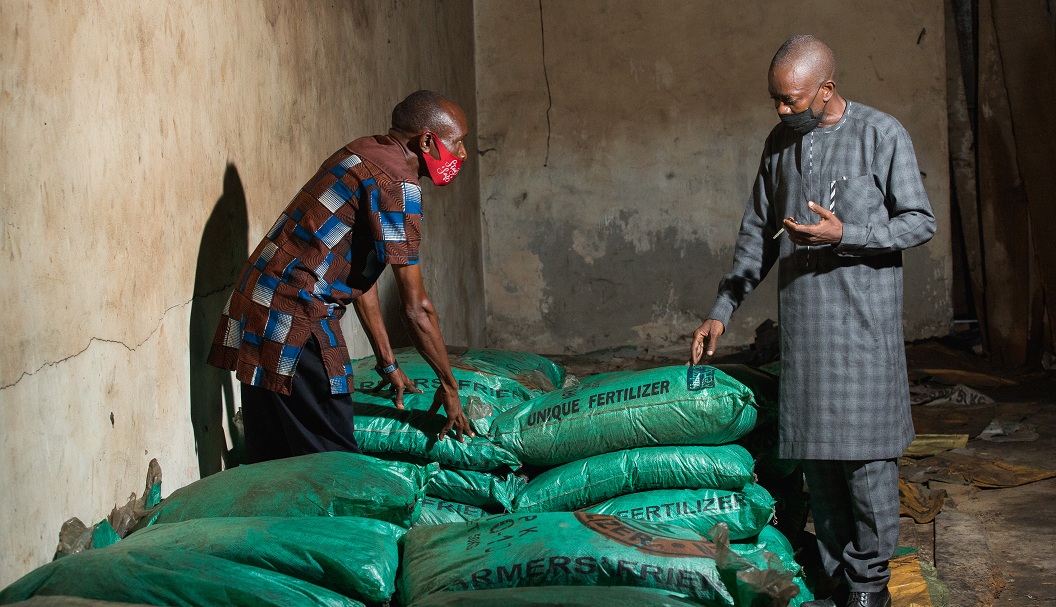REDUCING POVERTY
Surviving the COVID-19 Threat: Funding Innovations for Smallholder Farmers & MSMEs
Summary of Outcomes in 2020
MSMEs accessed NGN 3.3 Billion Loans
AKANDU GODWIN, PIND-TRAINED AGRO-DEALER IN RIVERS STATE.
‘’Training these farmers, they always complain. Some of them say,” We want to expand, how do you come to our aid’’? So, we package them together in groups in clusters. And, as I am talking to you right now, they are being taken to the CBN under the Anchor Borrowers programs so that it can help them to maintain their plantation. It can help them to expand their farms. They are following their CBN processes; they have been introduced, they have been trained by DDI (a PIND-trained BSP), interviewed, asked to package their papers. And they have done all those things. They are now feeling the impact of PIND.’’

Smallholder farmers and MSMEs in the Niger Delta encounter difficulty getting funds from financial institutions because of several factors. These factors include inappropriate financial products for the agricultural value chains; perceived low productivity and competitiveness in financing the sectors; and the perceived risk associated with agricultural financing.
PIND’s approach to improving access to funds for smallholder farmers and MSMEs entails developing new, inclusive financial models built around the peculiarities of the agricultural and agro-allied sectors. To qualify for the funds and loans from commercial banks, MFBs, and equity investors, we encouraged a crop of BSPs (business service providers) to support smallholder farmers and MSMEs.
The BSPs saw opportunities to leverage funds for MSMEs through the programs initiated by the government, such as Agri-Business/Small and Medium Enterprise Investment Scheme (AGSMEIS), the COVID-19 intervention fund, and the Anchor Borrowers scheme. Available to different sectors, the loans are meant to assist MSMEs in buying new equipment and in improving their working capital to meet existing market opportunities and to jumpstart job creation and economic growth.
PIND deepened the relationships between the business service providers and financial institutions, notably the Central Bank of Nigeria (CBN), to unlock access to capital for MSMEs under various financing schemes such as AGSMEIS and NISRAL MFB.
Success Snippet
Sombreiro Kapital, a PIND-established corporate enterprise, tested and evidenced the viability of new unique financial models and products for smallholder farmers in the aquaculture, palm oil processing, and poultry sectors in the three (3) states of Bayelsa, Delta, and Ondo.
Ahead of the loan facilitation, PIND-built partnerships (with financial and non-financial institutions) to pilot transactions and provide Sombreiro Kapital the needed platform. This platform helped to facilitate loans to smallholder farmers through a licensed commercial bank and build the initiative’s success through the efficiency of smallholder farmers. Then, PIND-onboarded farm service providers (FSPs) who trained, appraised, and prepared 200 smallholder farmers for loan applications. Sombreiro Kapital’s partner commercial bank, Sterling Bank, approved 28 smallholder farmers’ loan applications for disbursement in January 2021 while the processing of the remaining applications is ongoing. The approval followed a first and second-round review of the loan applications using industry-based selection criteria unique to smallholder farmers.
In the second 2015–2019 strategic phase, PIND had set up Sombriero Kapital as an independent value-chain-finance facility that will engage new partners; test and scale innovative financial products; and mobilize additional capital to achieve development objectives.

